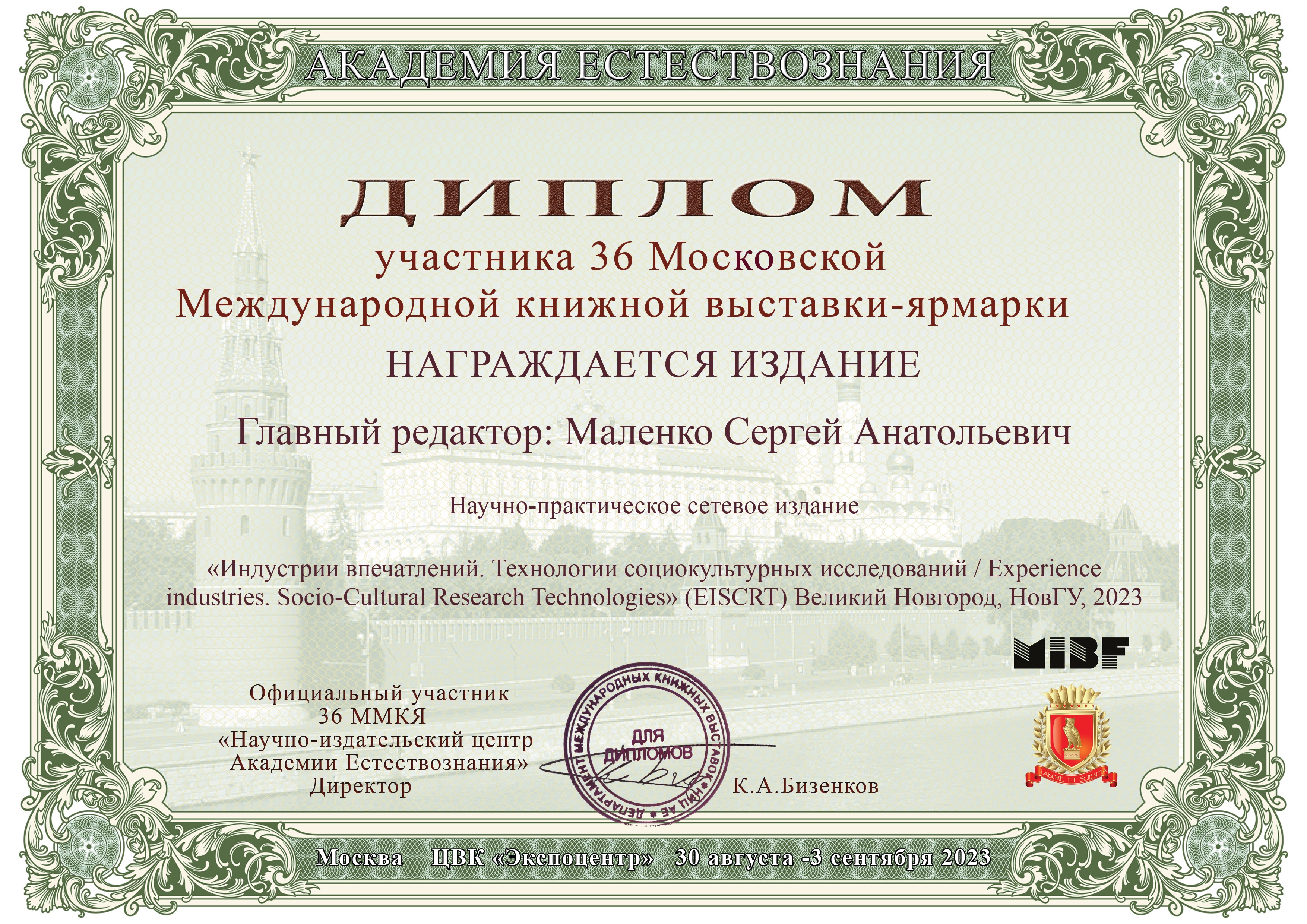ARTISTIC EXPERIENCE OF ACQUISITION OF MEANING: IMPRESSION, LANGUAGE, ACTION
DOI:
https://doi.org/10.34680/EISCRT-2023-4(5)-9-17Abstract
Dear readers!
The creative team of the journal “Experience industries. Sociocultural Research Technologies (EISCRT) ends the current year of 2023 with the fourth issue. According to the already established tradition, thematic sections present both those authors who have already been actively published in our publication, and those who we will meet for the first time. Thus, almost half of the authors of this issue represent various Moscow scientific schools, as well as the Tomsk academic tradition of modern sociocultural research.
The issue opens with the section “Reflections” with the disquisition of Elena Semenova, director of the Non-Profit Partnership “Theater-EX”, about the practices of foreign carnival culture and the scenarios for their reflection in linguoculturology. Analysis of the conceptual apparatus of current carnival practices is directly determined by the event outline of the modern decarnivalized and politicized world, which actively destroys the archetypal meaning of carnival culture as such.
The “Names” section offers two very interesting texts to readers. The first one by Nikolai Hrenov is devoted to the analysis of the work of Andrei Tarkovsky, who, according to the author, is not just an outstanding and talented director, creator of brilliant films, but also the initiator of a qualitative renewal of the artistic language of cinema, a master who directly created new facets of his philosophical and artistic symbolism. Kazan researcher Elena Yakovleva paradoxically qualitatively narrows the space of scientific interest, masterfully transforming the famous hit of Mikhail Shufutinsky into the subject of an original philosophical, cultural, and detailed art historical analysis.
The “Traditions” section in this issue is entirely devoted to the study of various facets of domestic and foreign cinema. Thus, the modern domestic drama series “Black Spring”, comes to the attention of our colleague from St. Petersburg Ekaterina Kolomeytseva, which is in her opinion a successful example of the implementation of metamodernist principles of contemporary art. Sergey Malenko and Andrey Nekita, continuing their many years of research into the archetypal, symbolic and ideological paradigms of Western cinema, draw the readers’ attention to the eternal contradictions of communication between the elite and the masses, originally visualized by Hollywood directors, using the examples of American horror films. Researchers from Veliky Novgorod state that films made in the USA in this genre each time aestheticize war in a non-trivial way and publicly promote violence as a natural form of existence of civilization.
In this issue of our publication, the “Horizons” section united the intellectual efforts of two young authors who, from different angles, analyze the dangers and contradictions of introducing digital technologies into the existential and communicative practices of modern man. Thus, Tomsk researcher Anna Shavlokhova draws attention to the contradiction between the image of a person’s “I” as a symbol of reality and its virtual analogue in the form of the “Extended Self”. One of the leading strategies for the formation of this conflict is precisely the modern game industry, which allows looking into the near and distant future of humanity. Shirin Khan, who represents the intellectual tradition of the Institute of Philosophy of the Russian Academy of Sciences (Moscow) is trying to determine the role of virtual space in changing the identity of a person, primarily of representatives of the younger generation on the pages of our publication. Having examined the positive and negative aspects of online communication, the author concludes about the exceptional importance of social networks in the process of forming and promoting a fundamentally new type of personality for the modern world - the digital native.
The fourth issue ends with a review of the recently published monograph by our Crimean colleague Stanislav Perekhod entitled “The Metaphysical Aspect of the Cultural Identification of Russian Civilization”, in which he seeks to summarize the history and achievements of the research tradition of Russian religious philosophy. On this basis, the author argues that it is possible to discover the Russian cultural code, which today, in the conditions of the triumph of social technologies, can make it possible to harmonize Russian society and significantly increase the level of spiritual cohesion of the Russian world.
The editorial board expresses confidence that the research published on the pages of our journal will find a wide response and will become the basis for the beginning of the next round of scientific and spiritual creativity, which will bring us all new knowledge and discoveries. We are open to interesting materials and will be happy to present the results of current sociocultural research to our attentive and discerning readers.
For citation:
Malenko, S. A. (2023). Artistic experience of acquisition of meaning: impression, language, action. Experience industries. Socio-Cultural Research Technologies (EISCRT), 4 (5), 9–17. https://doi.org/10.34680/EISCRT-2023-4(5)-9-17








